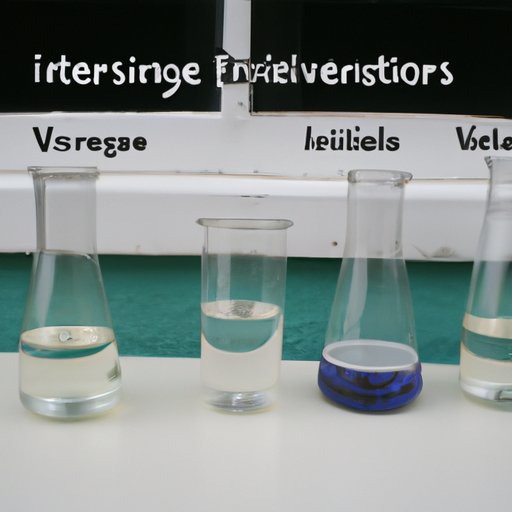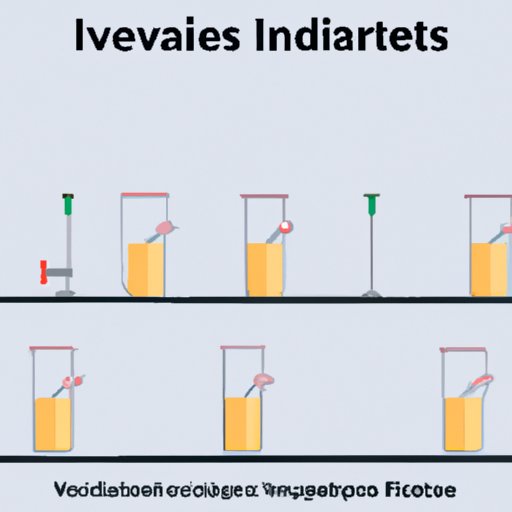Introduction
Independent variables are an essential part of any scientific experiment or research study. They are the variables that are manipulated by the researcher in order to observe the effects on other variables. In essence, independent variables are what determine the outcome of an experiment or research study. It is important to understand how these variables work and how they can be used to draw valid conclusions from experiments.

Exploring the Role of Independent Variables in Science Experiments
In order for a scientific experiment or research study to be valid, it is important that the independent variable is accurately identified and controlled. The independent variable is the one factor that is changed in the experiment, while all other variables remain constant. As such, it is essential that the researcher understands the impact that the independent variable can have on the outcome of the experiment. As noted by The Open University, “the independent variable is the factor that is changed or controlled in a scientific experiment to test the effects on the dependent variable.”
When manipulating an independent variable, it is important to ensure that only one variable is changed at a time. This ensures that the researcher can accurately measure the effect of the independent variable on the outcome of the experiment. For example, if a researcher were examining the effect of temperature on plant growth, they would need to ensure that all other factors such as light, water, and soil composition remained constant, so that any change in the plant growth could be attributed solely to the change in temperature.
What Factors Make an Independent Variable Essential in a Science Experiment?
An independent variable is essential in a scientific experiment or research study because it allows the researcher to observe the effects of the manipulated variable on the outcome of the experiment. Without an independent variable, it would be impossible to draw accurate conclusions about the effects of different variables on the outcome of an experiment. As noted by Scientific American, “an experiment usually has three kinds of variables: independent, dependent, and controlled. The independent variable is the one that is changed by the scientist.”
It is important to note that the independent variable should be carefully chosen in order to produce valid results. The independent variable should be selected based on the goal of the experiment and the hypothesis being tested. Additionally, it is important to consider the potential risks associated with changing the independent variable, as some variables may have unintended consequences. For example, if a researcher were testing the effects of a new drug on cancer cells, they would need to consider the potential side effects of the drug before administering it to the test subjects.
A Guide to Understanding Independent Variables in Scientific Experiments
In order to effectively use an independent variable in a scientific experiment or research study, it is important to understand the significance of the variable and how it can be used to draw valid conclusions. As noted by Science Buddies, “it is important to think about what factors could affect your experiment and decide which of those factors are independent variables that you will change.”
It is also important to consider the type of independent variable being used. Independent variables can be either continuous or discrete. Continuous variables are variables that can take on any value within a given range. Examples of continuous variables include temperature, pressure, and time. Discrete variables, on the other hand, are variables that can only take on certain values. Examples of discrete variables include gender, age, and number of participants.
Finally, it is important to consider the potential effects that the independent variable can have on the outcome of the experiment. Depending on the type of independent variable being used, it can have a significant impact on the results of the experiment. For example, if the independent variable is temperature, a small change in temperature can have a large effect on the outcome of the experiment. Therefore, it is important to ensure that the independent variable is carefully considered when designing an experiment.
Conclusion
In conclusion, independent variables are an essential part of any scientific experiment or research study. They are the variables that are manipulated by the researcher in order to observe the effects on other variables. By understanding the role of independent variables and how they can be used to draw valid conclusions from experiments, researchers can ensure that their experiments are valid and reliable.
In summary, independent variables are the variables that are changed or controlled in a scientific experiment to test the effects on the dependent variable. It is important to consider the type of independent variable being used and the potential effects that it can have on the outcome of the experiment. By understanding the role of independent variables and how they can be used to draw valid conclusions, researchers can ensure that their experiments are valid and reliable.

Final Thoughts on the Importance of Independent Variables in Scientific Experiments
Independent variables are a key component of any scientific experiment or research study. By understanding the role of independent variables and how they can be used to draw valid conclusions, researchers can ensure that their experiments are valid and reliable. Additionally, it is important to consider the potential risks associated with changing the independent variable, as some variables may have unintended consequences. Ultimately, understanding the role of independent variables is essential for conducting successful experiments.
(Note: Is this article not meeting your expectations? Do you have knowledge or insights to share? Unlock new opportunities and expand your reach by joining our authors team. Click Registration to join us and share your expertise with our readers.)
